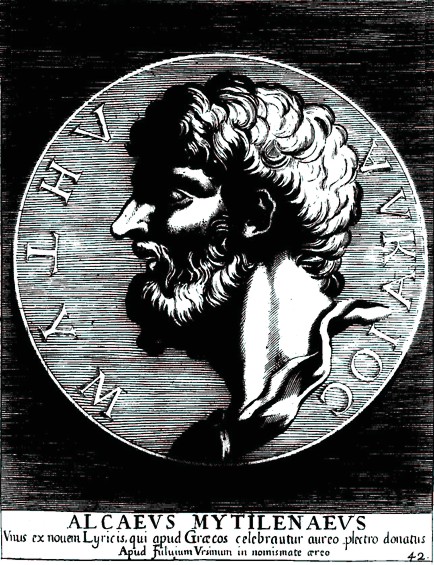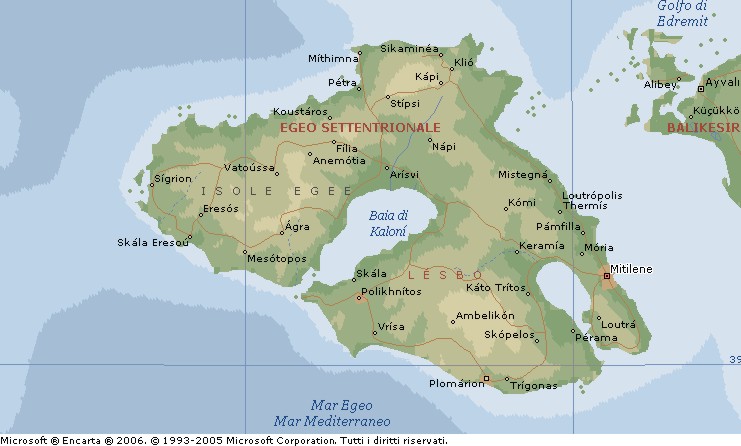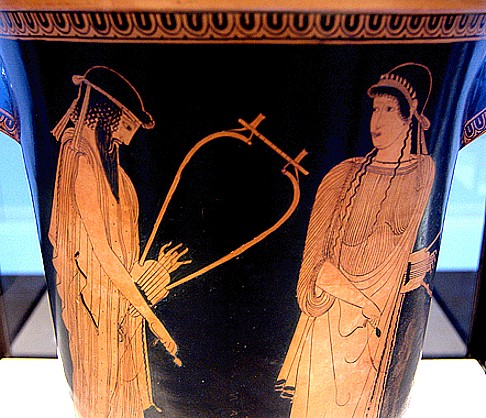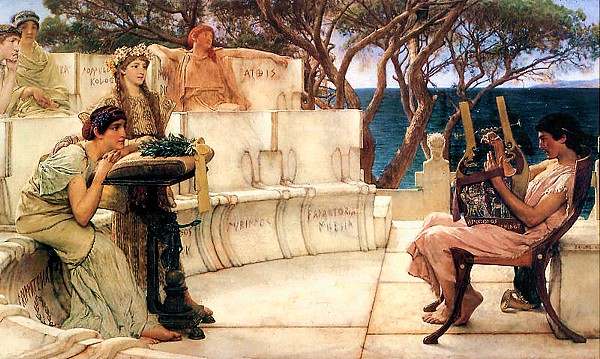Lessico
Alceo di Mitilene

da Veterum illustrium philosophorum etc. imagines
(1685)
di Giovanni Pietro Bellori (Roma 1613-1696)
In
greco Alkaîos, in latino Alcaeus. Uno dei maggiori poeti greci
(Mitilene, isola di Lesbo, seconda metà del sec. VII - sec. VI aC).
Rappresenta, con Saffo![]() ,
sua contemporanea, la lirica eolica. Di famiglia aristocratica, si gettò
nella lotta politica, animatrice della sua vita e della sua poesia. Caduto il
tiranno Melancro nel 612, gli succedette Mirsilo e Alceo dovette ritirarsi a
Pirra, un'altra cittadina di Lesbo; poi anche Mirsilo cadde, vittima di una
congiura, con grande gioia del poeta.
,
sua contemporanea, la lirica eolica. Di famiglia aristocratica, si gettò
nella lotta politica, animatrice della sua vita e della sua poesia. Caduto il
tiranno Melancro nel 612, gli succedette Mirsilo e Alceo dovette ritirarsi a
Pirra, un'altra cittadina di Lesbo; poi anche Mirsilo cadde, vittima di una
congiura, con grande gioia del poeta.

Ma fu gioia di breve durata, perché il popolo diede il potere a Pittaco, un tempo alleato della fazione nobiliare, e Alceo fu costretto a un secondo esilio. Dall'esilio in Egitto Alceo non cessò di scagliare versi furenti contro i suoi compatrioti e il tiranno, che considerava un traditore; tuttavia fu riammesso in patria dallo stesso Pittaco e là certo il poeta invecchiò con passioni ormai sedate, fra amori e banchetti.
Alceo occupa nel canone dei lirici stabilito dai critici alessandrini il secondo posto dopo Alcmane. Le sue poesie costituivano allora 10 libri; se ne conoscono solo circa 150 frammenti, ricavati in maggioranza da papiri. Le prime della raccolta cantavano, in inni strofici, dei ed eroi; seguivano quelle, assai appassionate, di battaglia politica (Stasiotikà), fra cui celebri l'allegoria della nave dello Stato sballottata dai flutti, il grido di esultanza per la morte di Mirsilo, l'ironico racconto della propria fuga in battaglia con l'abbandono dello scudo, la descrizione della sala d'armi; e infine i canti amorosi e simposiaci per i compagni, i giovinetti amati, il banchetto allietato dal vino.
La
poesia di Alceo si distingue per la grande spontaneità e la forza passionale.
Il suo mondo poetico ruota sui due temi della lotta politica e del banchetto:
poesia di casta dunque, ma in cui si affonda tutta la carica vitale di una
concezione virile della vita. A lui s'ispirò nel canto della fugacità della
vita e del vino inebriante, ma non certo nel tono, assai meno intenso e
immediato, Orazio![]() ,
che riprese anche la strofa di quattro versi (due endecasillabi, un
enneasillabo, un decasillabo) detta, da Alceo, alcaica.
,
che riprese anche la strofa di quattro versi (due endecasillabi, un
enneasillabo, un decasillabo) detta, da Alceo, alcaica.
Alceo
Alceo (in greco Alkaîos; Mitilene, seconda metà del sec. VII - sec. VI aC) è stato un poeta greco, vissuto tra il VII e il VI secolo aC. Di famiglia aristocratica, fu implicato nelle vicende politiche della propria terra, osteggiando duramente i tiranni Melancro e Mirsilo, tanto da essere costretto a recarsi in esilio. Tornato in patria, combatté in Troade contro gli Ateniesi per il possesso del Sigeo, ma anch'egli, così come Archiloco, fuggì gettando lo scudo. Nuovamente in esilio in seguito all'ascesa di Pittaco, uno dei Sette Sapienti, tornò a Lesbo grazie all'amnistia del 580 aC, vivendo in patria fino alla morte.
I temi delle sue opere sono la passione politica, l'amore, l'occasione conviviale, la battaglia e la precarietà della vita e sono trattati con tono decisamente aristocratico commisto a una vivacità di espressione. La sua poesia rispecchia le idee della propria eterìa (nome con cui nell'antica Grecia venivano designate le associazioni di hetaîroi – amici - sorte originariamente per la mutua assistenza funeraria e nei tribunali).
I versi di Alceo furono raccolti in età alessandrina da Aristofane di Bisanzio e Aristarco di Samotracia in dieci libri, che comprendevano:
Inni: "Inno ad Apollo" (di cui rimane solo il primo verso, ma possiamo ricavare la parafrasi da un'orazione di Imerio), "Inno a Hermes" (di cui rimane solo la prima strofa) e "Inno ai Dioscuri" (che ha un precedente nel XXXIII inno omerico e un seguito nel XXII idillio di Teocrito);
Peani;
Carmi della lotta civile (stasiotikà mèle), cioè canti politici e d'indole battagliera (celebre l'immagine nella quale si paragona Mitilene a una nave, il mare alle alterne vicende, e la tempesta alle battaglie, poi ripreso da Orazio, Carm. I,14);
Canti conviviali (symposiakà mèle), nei quali si celebrano i lieti banchetti e i convitti dell'eterìa, ossia del ristretto circolo aristocratico (noto l'invito alla baldoria in seguito alla morte del tiranno Mirsilo, poi in Orazio, Carm. I, 37: Nunc est bibendum);
Canti erotici (erotikà mèle), poesie a carattere erotico.
Di Alceo restano circa 400 frammenti, anche se numerose citazioni si ritrovano in Orazio. Il dialetto utilizzato da Alceo è l'eolico misto ad alcuni ionismi. È una lingua poco letteraria, infatti si trovano pochi omericismi, ed è più simile alla lingua parlata, poiché aveva una funzione conativa.

Alcaeus and Sappho, Attic red-figure kalathos, ca. 470 BC.
Alcaeus of Mytilene (c. 620 BC –6 th century BC), Greek lyric poet who supposedly invented the Alcaic verse; he was an older contemporary and an alleged lover of Sappho, with whom he may have exchanged poems. He was born into the aristocratic governing class of Mytilene, the main city of Lesbos, where his life was entangled with its political disputes and internal feuds. The date of his death is unknown.
During a rebellion headed by Pittacus of Mytilene, a violent civil war broke out on Lesbos. Alcaeus sided with the rebels and his (probably much older) brothers joined with Pittacus in a coup d'état which toppled the aristocratic Melanchros from power. For some time, Alcaeus was allied to Pittacus, even fighting alongside him in a battle against the Athenians at Sigeion near Troy where Pittacus defeated the Athenian commander, Phrynon, in single combat. Herodotus claims that Alcaeus ran away from the battle of Sigeion, and the allegations of cowardice are angrily answered in some of Alcaeus' verses.
Alcaeus joined in an unsuccessful plot against Myrsilus, whose influence became strong following the removal of Melanchros. Pittacus, however, aligned himself with Myrsilus and Alcaeus went into exile. After the death of Myrsilus, Alcaeus seems to have been reconciled to Pittacus and returned to Mytilene. This new alliance was not to last, however, and Alcaeus again found himself forced into exile, traveling as far as Egypt. One of his brothers joined the Babylonian army and fought under Nebuchadrezzar II. It is believed that Alcaeus eventually returned to Lesbos but his poetry includes bitter denunciations of his mistreatment at the hands of one-time friends as well as of long-time enemies.
Alcaeus' experience in war and politics are reflected in his extant poetry, much of it military in nature. There are references to mad efforts to survive upon a ship sinking in rough waters, the sight of helmets and spears, the relief of welcoming a brother home from war. He also rails against the danger of tyrants and the accusations of cowardice that arose when he was the sole member of his company to survive a battle.
Still, Alcaeus' lively verses extolled revelry, gambling, friendship, and the rough life at sea. There are softer subjects, as well: love songs to his eromenoi, drinking songs and the destruction a man incurs by living a life of dissipation. All of these were the kind of poetry that would be read aloud at a symposium. He also produced hymns to the gods, for more solemn occasions. Most of his work exists only in tattered fragments.
When his poems were edited in Hellenistic Alexandria, they were reported to have filled ten scrolls. However, the poetry of Alcaeus has survived only in quotations: "Fighting men are the city's fortress" and the like, so judging him, rather than his high reputation in antiquity, may be compared to judging Ben Jonson through Bartlett's Familiar Quotations.
His boy love poetry is represented by fragments 346, 359, 366, 368, 386, 397, in which he addresses two of his eromenoi, Melanippus and Menon. Some speak of seduction: addressing his lyre he sings, "Child of rock and foaming sea! You soften the wits of boys, oh sea-borne tortoise shell."(359) Others extend a frank invitation: "You used to be a friend - someone to invite to kid and pork: such is the custom in these matters." (71)
Alexandrian scholars agreed that Alcaeus was the second greatest monodic lyric poet among the canonic nine. The considerable number of fragments extant, and the imitations of Alcaeus in Latin by Horace, who regarded Alcaeus as his great model, help us to form a fair idea of the character of his poems.

Sappho et Alcée par Lawrence Alma-Tadema (1881)
Alcée de Mytilène est un poète grec de l'époque archaïque, représentant de la poésie lyrique monodique. Le Canon alexandrin voit en lui le second des poètes lyriques grecs. Il est né à Mytilène, tout comme Sappho dont il fut le rival et l'amoureux, la ville la plus importante de l’île de Lesbos, vers l’an 630 av. J.-C. Pendant sa jeunesse, sa famille fut activement engagée dans la politique locale de sa ville natale. Les membres de sa famille appartenaient à l’opposition contre les tyrans régnant. Cette attitude fut probablement la cause de son exil. Nous savons qu’il a beaucoup voyagé, et qu’il a visité l’Égypte et la Palestine. Il est mort vers 580 av. J.-C.
Ses poèmes ne nous sont transmis que partiellement: il s’agit d'hymnes, de chants politiques et belliqueux, de louanges du vin et de la bonne table, de chants d’amour. Un aperçu des hymnes est possible grâce à une paraphrase de son Hymne à Apollon par le sophiste Himérius (IVe siècle de l'ère chrétienne). Mieux encore, un papyrus a permis la conservation de la moitié de l’Hymne aux Dioscures. Il s’agit d’un hymne « clétique » (du grec klêtikós, « qui sert à appeler »), c’est-à-dire invoquant la présence des dieux qu’il chante.
Les hymnes guerriers (polemiká), dits aussi « séditieux » (stasiôtiká, c’est-à-dire concernant une guerre civile) ont été mieux conservés. Il s’agit de chants sur les guerres menées par Mytilène, en particulier contre les Babyloniens.
Enfin, les poèmes politiques déplorent la fin de l'aristocratie et l’émergence d'un monde gouverné par l’argent. Il s’attaque aux tyrans qui règnent sur son île, en particulier à Pittacos, qui a pourtant été compté comme l’un des sept sages: il attaque sa basse extraction et l’accuse de traîtrise. Sa verve en la matière, et son habileté à manier l’invective seront ensuite admirées par Denys d'Halicarnasse.
La frontière est parfois difficile à établir entre les poèmes politiques et les chansons de table. En effet, Alcée boit parfois à la mort du tyran Myrtylos, et en profite ailleurs pour attaquer Pittacos. Néanmoins, Alcée se montre très varié dans les thèmes de ses chants de banquet: tout ou presque lui est prétexte à boire. Certains de ces chansons font également allusion à l'amour: il loue ainsi le « charmant Ménon » ou encore, selon Horace (Odes, 1, 32, 10), « le beau Lycos aux cheveux et aux yeux noirs », ainsi que bien d'autres jeunes gens.
La langue d'Alcée est le dialecte éolien, et son vocabulaire est parsemé de formations homériques. Il est à l'origine de la strophe alcaïque, qui sera utilisée notamment par Horace.